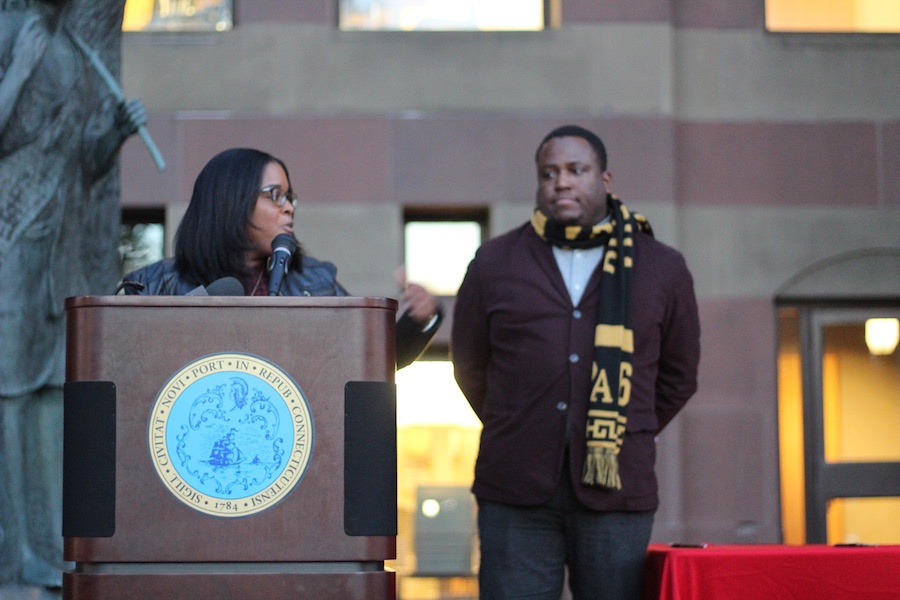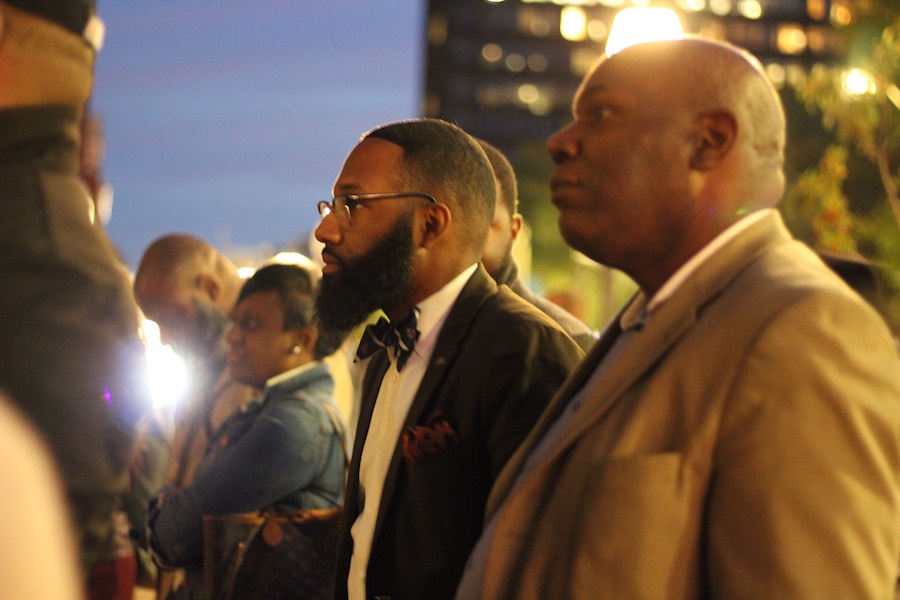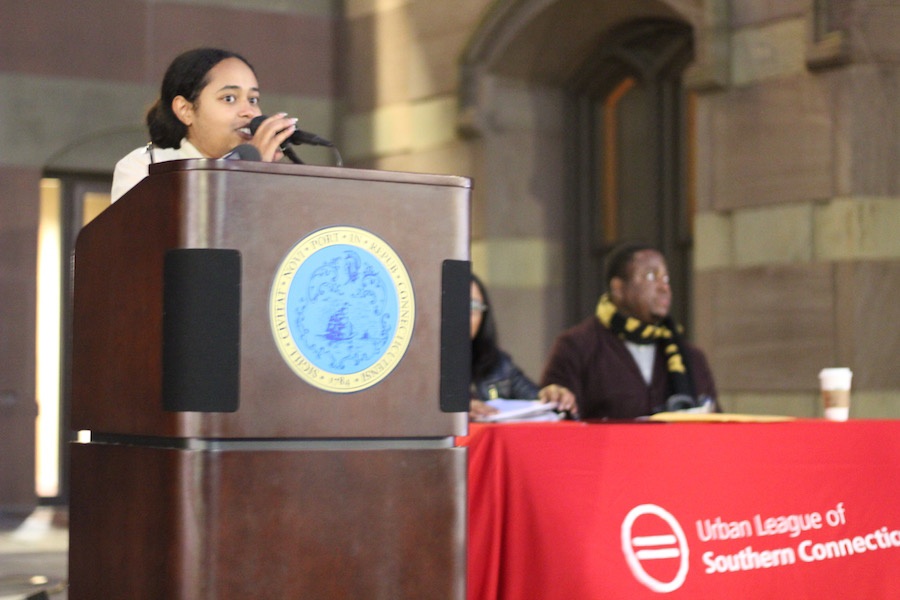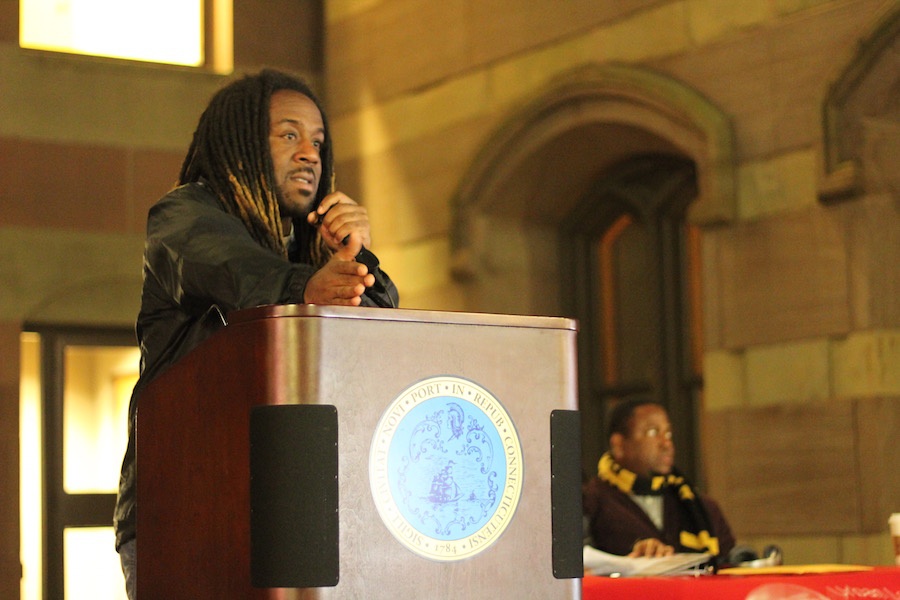
Politics | Arts, Culture & Community | Campaign 2018

| Co-Organizers Ratasha Smith and Darryl Brackeen, Jr. Lucy Gellman Photos. |
Get educated about the candidates. Make sure you’re registered by October 30. Make a plan for Election Day—which falls on November 6 this year. Commit that date to memory. And by all means, bring at least two, maybe three young friends with you to the polls.
Tuesday night, speakers from the Urban League of Southern Connecticut Young Professionals (ULSCYP) delivered that message at a get out vote rally outside New Haven’s City Hall, speaking at a podium between the building’s steps and Amistad Memorial. The push to the polls, which came exactly three weeks before the state’s Nov. 6 gubernatorial election, is part of the National Urban League’s “Enough is Enough” campaign, a national nonpartisan initiative designed specifically to engage millennials of color to register and vote.
The rally was organized by ULSCYP President Ratasha Smith and Upper Westville Alder Darryl Brackeen Jr., managing director of outreach for Educators for Excellence. Around 30 people attended, the crowd growing even as the air became brisk and temperatures slowly dropped into the 40s.
“Enough Is Enough” seeks to address a data point: millennials, particularly young people of color, are registering to vote in higher numbers than they were two and four years ago—but they still aren’t coming out to vote in midterm elections. In July, a poll released by the Public Religion Research Institute (PRRI) and The Atlantic suggested that only 28 percent of millennials have committed to voting in the midterm elections. For Smith, who is 30, that number is far too low—and one that can be fixed if a critical mass pushes back against it.

| Legislative Services Director Al Lucas and Donovan Tracey, Jr. in the audience. |
“I’m tired of hearing that millennials don’t do things,” said Smith, who also serves as a communications officer at the Community Foundation for Greater New Haven and founder and chief executive officer of BlackNHV. “That millennials don’t vote, and millennials are lazy. I hate that narrative. We’re trying to get young people of color out to vote … it’s important for us to get people informed, get them registered, and get them to the polls. Cause so much is at stake right now.”
Over an hour, a fiery lineup of speakers sought to do just that, focusing in on immigration, education, economic access, and the environment as reasons to register, show up at the polls, and bring a few friends along for good measure. Working to get the crowd fired up, Brackeen told attendees that he understands how easy it is to feel powerless, disenfranchised and politically apathetic in the current political environment. He’s watched as local, state and national candidates reach out to millennial voters before an election, only to overlook their needs once they’ve clinched the votes they need.
But the answer, he suggested, isn't not voting. He urged attendees to look into the candidates in their district and state, and reach out to them with pointed policy questions on student loans, city and state finances, and intergenerational debt. Using Georgia and Florida as examples—states that just opened early voting, and have been criticized for allegedly heavy voter suppression—he suggested that Connecticut voters needed to remain vigilant, or their basic rights could be taken away from them.
"I believe that this year, amongst all of the things that are happening here in America, and in our state, and in New Haven, that we're gonna stand up," he said. "We wanna vote for something based on principles. We wanna vote knowing that those that we put in public office are going to represent us in an excellent manner, and not in the way that we're seeing the folks in Washington D.C. conduct themselves. It's definitely time for a change."
He added that recent reporting from the Secretary of State's Office has bolstered his spirits: in the state, since October 2012, almost 44,000 people between the ages of 18 to 25 have registered to vote. Since the November 2016 presidential election, there's also been an overall rise in registration—103,436 newly-registered Democrats, 53,371 newly-registered Republicans, and 168,090 newly-registered unaffiliated voters in the state of Connecticut.
But that doesn’t mean anything unless they show up.
“We are the voices that brought change to this country,” he said. “We have to stand up. We have to come out and vote. We have to register our friends and family, who feel disenfranchised. We have to raise those voices. We have to get them to the polls. We have to volunteer. We have to work the polls! We have to get absentee ballots to the polls.”

| Francis Nuñez. |
Jonathan Gonzalez-Cruz, a graduate student in economics at the University of Connecticut and civic engagement coordinator at CT Students for a Dream, took a study break from midterm exams to encourage attendees to “vote for the right candidates” as a way to protect immigrants and their families in the state of Connecticut. He honed in on the state's gubernatorial election, the outcome of which could affect the Connecticut Trust Act, a piece of 2014 legislation that prohibits state and local law enforcement from involving Immigrations and Customs Enforcement (ICE) officials.
When he was a sophomore in high school, Gonzalez-Cruz returned home from school one day to learn that his father had been stopped and detained for a minor traffic violation. Gonzalez-Cruz was confused: if it was just a minor traffic stop, his father should have been home the same day. But police had brought in ICE. A week later, his father was deported. Gonzalez-Cruz was 16. His brother had just graduated from elementary school.
“You never think it can happen to you, you never think it can happen in the state of Connecticut, until it does,” he said. “The state of Connecticut needs to elect officials who are willing to defend immigrant rights, who are willing to stand up to what this administration is doing.”
After the 2016 presidential elections, Gonzalez-Cruz made his own choice to come out of “the shadows” in which he was living and organize for stronger immigrant rights in the state and the country. He urged attendees to find the issue that made them most passionate, and do the same. His voice shook as he recalled learning the details of families separated at the border, children left in detention for days without proper care or nutrition. A few days ago, he said, he became enraged reading coverage of young children appearing in court alone, still separated from their families after federal assurance that they would be reunited.

Other speakers gave concrete suggestions with just 21 days to go until the election. Lifelong New Havener Wayne Worthington (pictured above) spoke about his decision not to vote in the 2016 presidential election, the outcome of which has spurred him to become involved in voter turnout efforts. He asked attendees to both familiarize themselves with candidates and hold them accountable through the election process, engaging with them directly and talking about their platforms at home and with friends. Donavan Tracey Jr., academic dean of mathematics at Achievement First Academy, advocated voting as a way to protect, preserve, and grow education in the state.
A community organizer at Bridgeport-based FaithActs for Education, Francis Nuñez recalled recognizing that “there is an issue with marginalized communities not voting, and we don’t talk enough about why that is,” and looking for solutions in her work.
She laid out several concrete solutions, urging attendees to implement them in the next three weeks. In Bridgeport, she leads a nonpartisan effort to get a verbal commitment from voters that they will show up to the polls, an initiative that has gained thousands of Bridgeport voters in the last three years. She speaks directly with residents of the city's majority-minority neighborhoods, learning about why many of them don't vote before launching into her pitch for civic engagement. She reminds voters—fellow millennials, but older voters, family members, and friends too—how much may be at stake for people of color if certain candidates are elected. Echoing Brackeen, she deplored alleged attempts at voter suppression in Georgia and Florida, suggesting that they could come north if voters don't pay attention.
“We have no idea how much they’re trying to stop us,” she said. “And if we knew, I think millennials and young adults, we’re rebellious in a way. If we really knew that they were trying to stop us, the line would be around the corner to go vote. Because we really do not like people telling us what we can and cannot do. So if it matters at all to you, have conversations with your friends and family about how much they don’t want us voting on November 6.”
“Registering to vote is not enough,” she added. “We have to get us to the polls, and we have to get in a place where we are empowered to cast our vote in a way that matters. Because it always matters.”
As the rally wound down, Smith returned to the podium, hand-in-hand with her 7-year-old son Jayden. If attendees hadn’t yet found a reason to get themselves—and two, or three, or your friends—to the polls, the future of another generation was enough to keep her motivated.
“I’m trying to do my part,” she said. “Anything I can do to help move this forward, I would have. New Haven’s my city. I love New Haven … and there’s people that we need to get to. I want to make sure that we get to them before November 6. Or before October 30 [the registration deadline], so we can get them to the polls November 6.”

